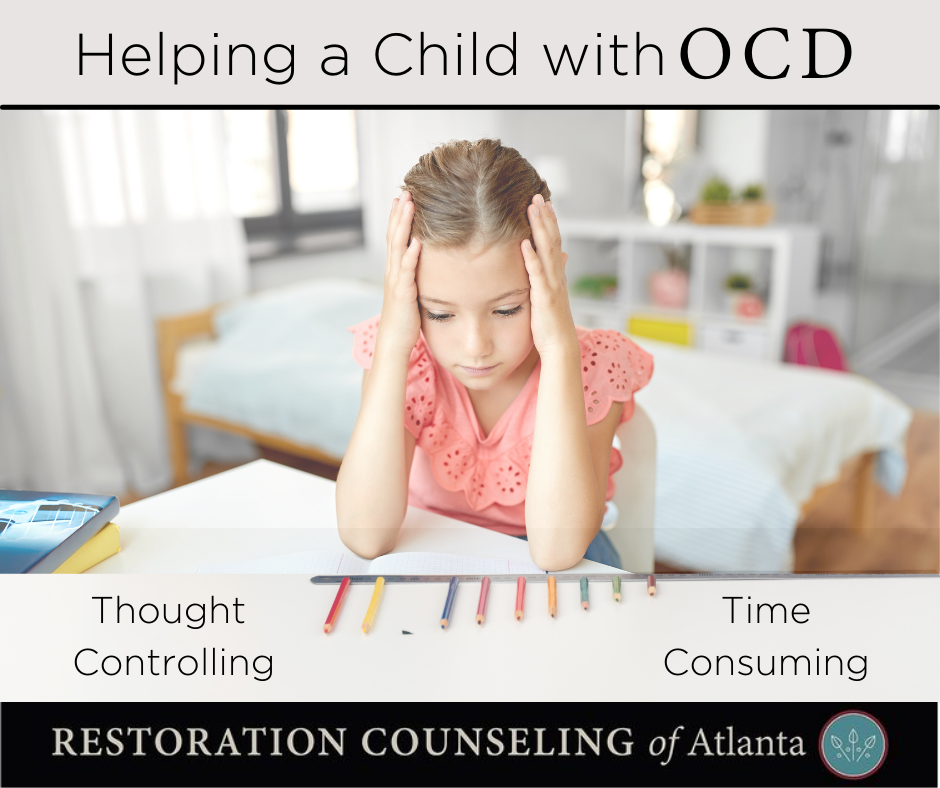Thought Controlling, Time Consuming – OCD
Although the room was quiet, OCD roared in the young girl’s mind, “Brush your teeth. Get in the car. Get out of the car. Get back in the car. If you don’t do this three times, your parents will die.” This obsessive message tormented the girl. Every morning, her mother would sit in the car with the engine running, ready to drive her daughter to school. The girl would lower herself into the passenger’s seat and barely sit down before she was up and out of the car and heading back into the house to repeat the ritual.
When the behavior first began, her mother was puzzled but supportive. She reassured her daughter that running back and forth to the house had nothing to do with dying, and she reminded her that ultimately God oversaw their well-being. The girl agreed. She logically knew that obeying the obsessive message was not at all related to her parent’s safety. Still, the thought was coupled with such intense fear that she was compelled. She could not stop. With each passing day, her mother grew more frustrated as she waited for her daughter to complete the morning ritual. Their once peaceful mornings together were now filled with dread as they argued over time and tardiness while the young girl, tears streaming down her face, ran back and forth between the house and car, trying frantically to keep her parents safe by meeting OCD’s demands. The relationship between the girl and her mother grew strained. They both felt helpless and trapped because none of it seemed to make any sense. Obsessive-compulsive disorder held them prisoner in a routine that they knew had no foundation in reality.
What is OCD?
The obsessive-compulsive disorder consists of automatic thoughts (obsessions) followed by behaviors (compulsions) that people do to alleviate an unwanted feeling. It is a brain disorder that, if left untreated, can severely impact the quality of a person’s life. It often begins in early adolescence or early adulthood and affects a person’s thoughts and behaviors and how they interact with the world. While it may be confusing to distinguish OCD symptoms from everyday child-behavior, there are some things for which parents can be on the lookout. If you notice your child (or yourself) engaging in any of the following actions, seek help.
Signs of OCD
- Touching items a specific number of times or in a specific order
- Having a preoccupation with germs or getting sick
- Having a preoccupation with certain numbers, counting, or odd and even numbers
- Consistently wanting things arranged in the same order
- Excessively seeking reassurance
- Displaying excessive agitation if routines are interrupted
- Expressing excessively disturbing thoughts
- Checking and rechecking things
- Excessively praying or displaying concern about religious thoughts
How OCD Keeps Someone Stuck
The brain is a complex network of neural circuits. The circuits in a standard brain are different from the circuits in a brain with OCD. In a standard brain, information comes in through the senses, is processed, and forms a thought, emotion, and/or behavior. In a brain with OCD, information enters the brain through the senses, and two (or more) pieces of unrelated information are paired together and coupled with a negative emotion such as fear or doubt. This information is perceived by the brain’s owner as an OCD-related automatic thought (obsession).
In the example above, the girl’s morning routine was tied to her parents dying. The OCD also promised the girl a safety-solution which communicated that if she does the routine three times (compulsion) her parents will be ok. The girl did not want this obsessive thought. She knew it didn’t make sense. She did not feel like engaging in the routine. It slowed her down, impacted her school attendance, and adversely affected her relationship with her mother. The thought simply happened to her, was coupled with fear, and the compulsion took over like a large untrained dog pulling its owner down the street on a leash.
Treatment for OCD
The good news is that OCD doesn’t need to be in charge or take over a person’s life. It is very treatable. Children and teens with OCD benefit the most when they work with a team that includes a psychiatrist and a counselor trained in a type of therapy called Exposure and Response Prevention (ERP). Psychiatrists evaluate how OCD is impacting a person and prescribe and monitor medications that raise the level of serotonin (a natural chemical) in the brain. Increasing the serotonin level in the brain provides relief by decreasing how often obsessive thoughts come to mind and how long the thoughts last. Counselors trained in ERP are knowledgeable about OCD. They can help clients understand how it impacts their lives and teach the client how to stop the OCD cycle. If untreated, OCD is like an untrained dog pulling its owner down the street on a leash. It is the counselor who teaches the client to firmly keep the OCD controlled and calmly at heel.
How to Help at Home
If your child or teen is diagnosed with OCD, you can do things to support healing and growth.
- Take care of yourself and your own emotions. Parenting a child with OCD can be challenging at times. If you find yourself getting frustrated, let your child’s counselor know so that he or she can direct you to support.
- Remind your child that they are not the only ones experiencing these kinds of thoughts and behaviors. Information about OCD support for children and teens can be found at IOCDF.org
- Understand how the OCD cycle impacts your child’s thoughts and behaviors. Occasionally, a parent may become a part of the OCD cycle by being a consistent source of reassurance. Reassuring a child is a natural part of parenting. However, if reassurance is a part of an OCD cycle, it may be hindering a child’s progress.
- Help your child externalize OCD by giving it a name. This will help the child remember that OCD is acting on them and that THEY are not their OCD-related thoughts.
- Remind your child about the positive reasons to take charge of OCD
- Check in regularly with your child’s psychiatrist and counselor with concerns and questions.
If you suspect that you, your child, or someone you love is struggling with Obsessive-Compulsive Disorder, call a counselor. Life is too short to stay stuck!
2 Timothy 1:7 For God did not give us a spirit of fear, but of power, love, and self-control.
 Written by Andrea Brandt, NCC
Written by Andrea Brandt, NCC
andrea@restorationcounselingatl.com, ext. 154
Andrea received a Master of Arts degree in Clinical Mental Health Counseling from Richmont Graduate University, a Christ-centered university, and currently serves clients in Georgia as an Associate Professional Counselor under supervision and direction. She has continuing education and experience working with addiction and family-related issues, and in the application of Cognitive Behavioral Therapy (CBT), Exposure and Response Prevention (ERP) for OCD and Telemental health.
RESOURCES
International OCD Foundation iocdf.org
Go Zen -Go Hackify OCD Program for Kids https://gozen.com/dashboard/
Anxiety.org -https://www.anxiety.org/identifying-and-treating-children-with-obsessive-compulsive-disorder-ocd

